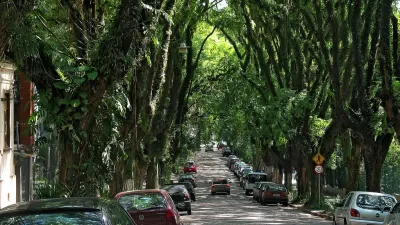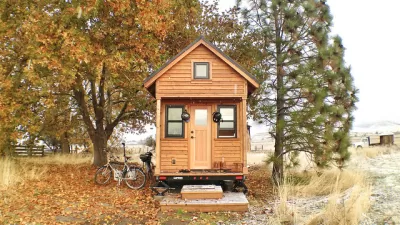Environment
How to Beat Extreme Heat
Louisville, Kentucky has recently been named the "most rapidly growing urban heat island" in the U.S., but what led to this title? Jeff Byles traces how cities are becoming increasingly warm through a number of different factors, including economic.
Protecting the Lungs of Children by Improving School Location
With the national spotlight rightfully focused on the irreversible effects of lead in the drinking water of Flint, Michigan, another insidious threat remains: motor vehicle emissions affecting children's lungs.
How the U.S. Environmental Protection Agency Failed the People of Flint
While blame squarely lays with Michigan state officials, agencies, and possibly Gov. Rick Snyder himself, the EPA also played a role by both detecting the cause of the problem but not acting on the reports of improper treatment of river water.
First Step to Restoring Drinking Water for Flint—Coat the Existing Pipes
Gov. Rick Snyder (R-Mich.) announced on Wednesday that the state is working to ensuring safe tap water for Flint residents. While there is no schedule to replace the corroded lead pipes, they are being treated to prevent further lead leaching.

How Neighborhood Trees Improve Public Health
New research reveals more of the details of how trees provide therapeutic effects for humans.
Reports Ranks U.S. 26th for Environmental Performance
The Environmental Performance Index (EPI) ranks performance on environmental issues in two areas: protection of human health and protection of ecosystems. "The U.S. falls in between Canada and the Czech Republic."

NJ Gov. Chris Christie Slams 'Selfish' Shore Residents
Gov. Chris Christie uses a Winter Storm Jonas press conference to chastise opponents of eminent domain for statewide dune system.
The Erosion of Public Trust
The damage caused by Michigan environmental agencies charged with protecting public health extend far beyond Flint. Residents suffering health effects from a huge natural gas leak in Southern California see parallels with the lead poisoning crisis.
Who Killed the Electric Car (in Georgia)?
Until this past summer, the Atlanta metro region was ranked second in electric car use in the United States. The generous state tax credit of $5,000 made electric vehicles (EVs) particularly attractive. But what happens when the credit is withdrawn?
D.C. Metro Will Be Closed for Commuting, But Capitol Hill Will Be Open for Sledding
A large winter storm is bearing down on the East Coast, prompting advanced preparations by local officials.
Students Submitting Ideas for the Hyperloop
As a part of a competition sponsored by SpaceX, university students and independent engineering teams are building scale-model Hyperloop pods.
Data Plus Community: A Winning Formula for Green Infrastructure
These days, Big Data is the topic at hand, but Arup's Vincent Lee says data analysis can only go so far. He uses his work on the New York Rising Community Reconstruction Program to illustrate why a "human element" is crucial to finding solutions.
Odd-Even Licensing Worked, So Why Is New Delhi Halting It?
Reporting from the world's most polluted capital, Julie McCarthy speaks with Ari Shapiro on NPR's "All Things Considered." McCarthy talks glowingly about how successful the two-week trial went in reducing pollution and congestion even more so.

Op-Ed: Carbon Pricing on Track in North America
Despite continued dispute over their effectiveness, carbon taxes and cap-and-trade programs in the United States and Canada have raised billions of dollars. And China has now followed suit.

A New Metric for Community Resilience
Though the need for resilient communities is obvious, exactly how to measure resilience is less obvious. Edward J. Jepson, Jr. provides a new metric of the evidence of a community's resilience and produces a corresponding ranking of 30 U.S. cities.

NIMBYs at Center of California's Housing Shortage
Sacramento Bee's political columnist, Dan Walters, writes that NIMBYs are among the main reasons for the state's chronic housing crisis, and one of their main tools is the California Environmental Quality Act, which must be reformed by politicians.

How Lizards Can Teach Planners About Designing Cities
Ecologists offer scientific lessons in how to better build cities for humans and wildlife.
Interior Department Halts New Coal Leases on Federal Lands
Following-up on the president's assertion in his State of the Union address to better manage coal and oil resources on federal lands to account for environmental and financial costs, the administration declared a 'pause' on issuing new coal leases.

Australian Cities Seek Out Design Solutions to Drunken Street Brawling
Faced with the calamity of drunken fisticuffs breaking out when the bars let out for the night, Sydney launched some common sense solutions to calm the hordes of angry drunks.

Are Tiny Houses All They Are Cracked Up To Be?
Maybe not so much, according to an article in the Globe and Mail.
Pagination
Urban Design for Planners 1: Software Tools
This six-course series explores essential urban design concepts using open source software and equips planners with the tools they need to participate fully in the urban design process.
Planning for Universal Design
Learn the tools for implementing Universal Design in planning regulations.
Gallatin County Department of Planning & Community Development
Heyer Gruel & Associates PA
JM Goldson LLC
City of Camden Redevelopment Agency
City of Astoria
Transportation Research & Education Center (TREC) at Portland State University
Jefferson Parish Government
Camden Redevelopment Agency
City of Claremont


































